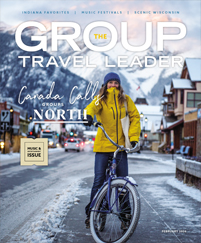Want a great way for your group to explore Black culture, past and present? Consider going back to school.
Historically Black colleges and universities, or HBCUs, are a treasured pillar of African American history and culture. From Pennsylvania’s Lincoln University, considered the first HBCU in the U.S., to Howard University, Washington, D.C.’s beloved school that has educated countless Black politicians and entertainers, there is no overlooking the influence and legacy of these institutions in Black culture.
There are more than 100 HBCUs in the country, but these are some of the best known. Campus tours offer prospective students an insider’s look into the schools’ rich histories, including their important roles in abolition and the Civil Rights Movement.
Lincoln University
Pennsylvania
Lincoln University was the first degree-granting HBCU in the country. Located in Chester County, Pennsylvania, the university has been a pillar in the community since 1854. Civil rights lawyer and Supreme Court justice Thurgood Marshall and Harlem Renaissance poet Langston Hughes and are some of the university’s most recognizable alumni.
On the 422-acre campus, groups can participate in Lion Campus Tours, traditional walking tours led by student ambassadors who guide groups through Lincoln’s history, programs and resources. Plan to book at least 14 days before your group’s visit, especially if dining on campus is on the itinerary, as advance coordination is required in partnership with Dining Services.
Kennett Square, a borough located about 13 miles east of the university, was an epicenter of the Underground Railroad. In 2018, the school partnered with a local organization, Voices Underground, to create The Lincoln University Center for Public History, a research and teaching center whose mission is to provide a home for ongoing research of Pennsylvania’s African American history.
Chester County’s Brandywine Valley tourism board suggests the Kennett Underground Railroad Center as an ideal experience for groups looking to learn more about the area’s connection to abolition and important African American history along the Underground Railroad.
Howard University
Washington, D.C.
Known colloquially in African American culture as “The Black Mecca,” Howard University was founded in 1867 and is one of the most popular HBCUs in the country. Its notable alumni include public figures like former Vice President Kamala Harris and author Toni Morrison.
The university offers student ambassador-led tours for groups of 10 to 55 people. Highlights of the campus tour include Thirkield Science Hall, where Omega Psi Phi Fraternity was founded on November 17, 1911, making it the first Black fraternal organization established on an HBCU campus.
The best time to visit is in the spring during cherry blossom season. Howard’s campus has five cherry blossom trees that the National Cherry Blossom Festival gave to the university in 2018. In the fall, homecoming season is full of unique peeks into student life, including a pep rally, parade and Greek Step Shows.
Howard is located in Shaw, a historically Black community once known as “Black Broadway.” In the 19th century, jazz legends like Cab Calloway performed in neighborhood theaters. Today, it’s full of buzzy restaurants like Doro Soul Food, headed by Michelin-starred Chef Elias Taddesse. Doro serves diasporic-inspired dishes that combine traditional African American soul food flavors with Ethiopian spices.
“As we celebrate America’s 250th anniversary next year, D.C. has an excellent opportunity to share with visitors the rich Black culture that is ingrained in the city,” said Elliott Ferguson, president and CEO of Destination DC. “Museums like the National Museum of African American History and Culture and the Go-Go Museum are must-sees. Engaging with D.C.’s culture by eating a half-smoke at Ben’s Chili Bowl or listening to a live show at The Howard Theatre lets you experience the history for yourself. There is so much more D.C. has to offer than meets the eye.”
Morgan State University
Baltimore
Maryland’s largest HBCU, Morgan State University, is located in Baltimore, a city long known for its charm. Groups touring Morgan will be surrounded by incredible Black-owned businesses and cultural experiences in the city, like the Reginald F. Lewis Museum of African American History & Culture. The Lillie Carroll Jackson Civil Rights Museum, owned and operated by Morgan State, is located about 12 minutes from campus in Marble Hill, a neighborhood that was crucial to the Civil Rights Movement.
A 90-minute campus tour at Morgan explains the university’s history and mission. The experience ends with a student-led walking tour highlighting places like the Earl S. Richardson Library and the student center. As an added touch, groups can download the Morgan State Mobile App ahead of time for access to a virtual campus map, news, events and more.
“Baltimore is a city rooted in innovation, community and culture, and Morgan State University is clearly part of that experience,” said Kireem Swinton, interim president and CEO at Visit Baltimore. “While the campus is always great to visit, two standout events that showcase its vibrancy are Morgan’s homecoming weekend in early fall and the CIAA men’s and women’s basketball tournament in late February. Both events offer a unique opportunity to connect with alumni and feel the energy HBCUs bring to our city.
“While on campus, be sure to visit the historic Read’s Drugstore lunch counter, a powerful symbol of the Civil Rights Movement and a reminder of the university’s role in shaping history,” Swinton said.
After touring, groups can plan to dine at locally loved restaurants like Rooted Rotisserie, a French-inspired restaurant owned by a husband-wife duo serving delicious rotisserie chicken, or The Urban Oyster, the first Black woman-owned oyster bar in the U.S.
Spelman College
Atlanta
Founded in Atlanta in 1881 as the Atlanta Baptist Female Seminary, Spelman College became a well-known institution for women of African descent in 1924.
Groups visiting can take tours, which typically last 45 minutes to an hour. Tours are led by Spelman Student Ambassadors, an organization of more than 100 Spelmanites representing a wide variety of majors, interests, hobbies and backgrounds. During the tour, ambassadors share personal stories and insights that bring the Spelman experience to life. Throughout the tour, guests see key landmarks and community spaces on campus, including Sisters Chapel, the Mary Schmidt Campbell Center for Innovation & the Arts, the Alumnae Arch and more.
Groups can align travel plans with some of the college’s fine arts performances and lectures that are open to the public to connect with current students, faculty and staff while gaining a deeper understanding of Spelman’s academic and social environment.
Morehouse College
Atlanta
Spelman’s neighbor, Morehouse College, is an all-men’s institution known for producing the highest number of Black men who earn doctorate degrees. For group leaders planning a visit, Morehouse offers reservations for 75-minute guided campus tours.
Logan Doctson, assistant manager of public relations at Discover Atlanta, suggested that groups visiting Spelman and Morehouse plan lunch at Busy Bee Cafe. Located on Atlanta’s Westside, the restaurant once served as a gathering place for the city’s Civil Rights leaders and remains a beloved local spot today.
“Following lunch, groups should explore Martin Luther King, Jr. National Historical Park, which features several landmarks, monuments and exhibits honoring Dr. King, a proud Morehouse graduate,” Doctson said. “To round out the itinerary, a stop at the APEX Museum offers powerful insight into the often-untold stories of African and African American history and culture.”











